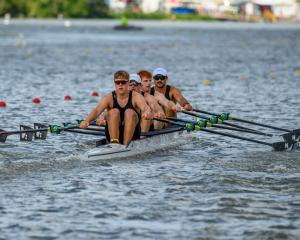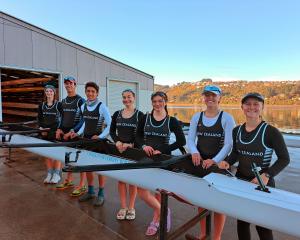Here, we present some of the lesser known members of the New Zealand Sports Hall of Fame.Today, Alistair McMurran looks at the careers of New Zealand rowing's first world champions - William Webb, Dick Arnst and Darcy Hadfield.
New Zealand had three world sculling champions from 1907 to 1923. It was the first golden era of rowing.
New Zealand rowers were at the forefront of the big match races that were held on rivers around the world at that time.
In the late 19th century, rowing was one of the many sports split between amateurs and professionals.
It was before the introduction of the TAB, but challenges for the world professional sculling title were heavily gambled on.
The races were also lucrative for the scullers, with a typical stake worth 500. That was the equivalent of between $80,000 and $90,000 in today's money. A working man would take several years to earn that amount at that time.
The highest purse won by one of New Zealand's world champions during that era went to Dick Arnst, who pocketed 1000 when he beat English champion Ernest Barry on August 18, 1910.
The race, held on the Zambezi River in Northern Rhodesia near the Victoria Falls, marked the centenary of the world-title match races that were first held on the Thames in England in 1831.
There were dangers in the race - hippos had to be deterred from interfering by a marksman.
Elephants also roamed the area and a large crocodile took a close interest in the single sculls.
The race was sponsored by the British South Africa Company, which thought the match would promote the company and the country.
Billy Webb, the first world sculling champion from New Zealand, was born in Lyttelton in 1880 and was aged 27 when he won the world title.
He was a natural athlete and was prominent in running and cycling. He became a world champion when he turned his attention to rowing.
Webb beat Australian George Towns on the Parramatta River on August 2, 1907, by five lengths to claim the world title.
Towns' protest, after a minor collision, was dismissed by the umpire and the world title stayed in New Zealand for the next five years.
The Wanganui pipe inspector returned home to a hero's welcome and was given a house for his efforts.
A train, with 22 carriages, brought a large crowd from Wellington in February 1908 to watch Webb defend his title over a 3-mile course on the Wanganui River, when he beat Australian Dick Tresidder.
It was the first world championships rowing race held in New Zealand and Webb won by three lengths in a time of 20 minutes 28 seconds.
This world title race was celebrated on the Wanganui River 100 years later when Olympic champion Olaf Tufte beat New Zealand's world champion Mahe Drysdale and world fours champion Hamish Bond. The winners' purse was $5000.
Webb lost his crown late in 1908 when he was beaten by Cantabrian Arnst by eight lengths on the Wanganui River.
Arnst won a rematch on the same course the following year by two lengths, with a fast time of 18min 15sec, and held on to the world title for another three years.
He beat fellow Cantabrian George Whelch on the Akaroa Harbour in 1910, Barry on the Zambezi River and Australian Harry Pearce on the Parramatta River in 1912.
That race highlighted the huge public interest in professional match racing, with 100,000 spectators lining the river.
Arnst suffered a setback on Christmas night that year, when beaten up by some drunks outside his Sydney boarding house.
The after-effects of those injuries, and a lifelong tendency to put on weight, meant he was not at his best when losing his title to Barry on the Thames River in England in 1912.
But Arnst's career was not over. He weighed 108kg when he resumed training after World War I and inherited Barry's world crown at the age of 36 when the Englishman declined to defend his title.
Arnst confirmed his world champion status when he beat fellow New Zealander Pat Hannan on the Wairau River, near Blenheim, in 1921.
He lost his world title the following year when beaten by 10 lengths by Darcy Hadfield on the Wanganui River in January 1922.
Arnst became a competitive shooter after retiring from sculling and won four New Zealand titles.
A Christchurch street, Arnst Place, and the Arnst River in the Nelson Lakes National Park are named after him.
Hadfield received wounds at the battle of Passchendaele in World War I in 1917 but had recovered to start at the Royal Henley Peace Regatta in 1919.
He was a member of New Zealand's first official Olympic team at Antwerp in 1920 and won a bronze medal in the single sculls. It was New Zealand's first Olympic rowing medal.
His preparation for the 1920 Olympics was interrupted during the nine-week sea voyage to Europe, because the team was delayed in both Australia and South Africa.
Hadfield lost his world crown three months later to Australian Jim Paddon on the Wanganui River and he failed to get it back in a rematch on the Richmond River in New South Wales the following year.
The golden age of New Zealand professional sculling was over.
Hadfield was inducted into the New Zealand Sports Hall of Fame in 1990, Arnst in 1995 and Webb in 1997.













